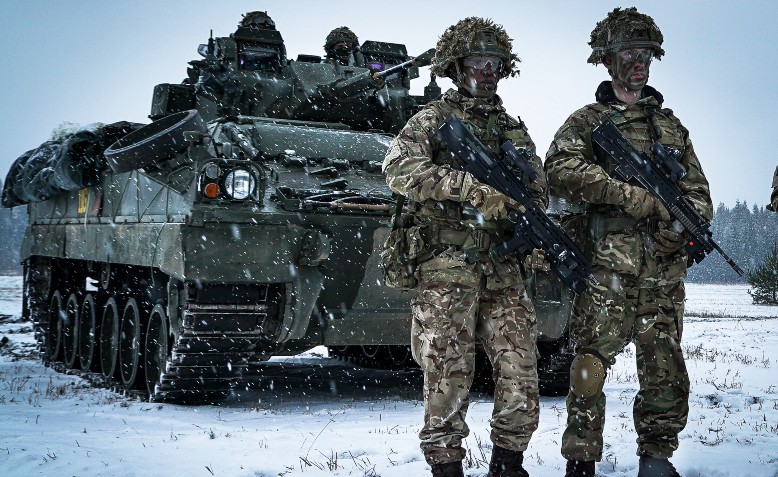 Photo: NATO – Flickr | cropped from original | CC BY-NC-SA 2.0 | license linked at bottom of article
Photo: NATO – Flickr | cropped from original | CC BY-NC-SA 2.0 | license linked at bottom of article
The West’s expansion has brought us to the brink of war, argues Vladimir Unkovski-Korica
Since last November, we have been listening to news of potential Russian invasion of Ukraine. The Kremlin has massed troops – over 100,000 – on Ukraine’s borders. Almost daily reports emerge of alleged Russian black ops, provoking or feigning an incident that would then be used as a pretext for a pro-Russian coup or Russian military intervention. British politicians have been competing to sound harder on Russia, calling for tougher sanctions, while Boris Johnson signed a deal to send naval vessels and missiles.
But there has been little real reflection about Putin’s motives. In reality, Russia is threatening invasion because of vital security concerns. Russian officials have been adamant that they want an cast-iron guarantee that Ukraine will not be allowed to join NATO. Since the fall of the Soviet Union in 1991, NATO has been expanding eastwards. If it was 1,000 miles from St Petersburg back then, with the accession of the former Soviet Baltic states in 2004, this became 100 miles. By 2020, fourteen former ‘communist’ states joined NATO. On its eastern march, NATO bombed Serbia, a Russian ally, for 78 days in 1999.
The eastward expansion of NATO reflects the West’s desire to encircle and weaken Russia, which brings us dangerously close to a war involving the West and Russia. Some have suggested that there is no real threat of a world war, since the US has repeatedly ruled out any military intervention against a Russian invasion. Moreover, much of the posturing around Ukraine in the West is for public consumption. Johnson has clearly been using the Ukraine crisis to distract from his domestic woes, for example.
More importantly, much of the EU depends on Russia for gas – up to two fifths of its gas needs are supplied from Russia – and we are in full winter. There is little appetite among key EU states like Germany for war with Russia. So, if a war were to break out, the argument goes, it would likely be localised and involve Russian aggression against Ukraine. We saw something similar before. In 2008, when George W. Bush encouraged Ukraine and Georgia to join NATO, Russia humiliated Georgia in a four-day war, and the West looked on.
Why Ukraine is a flashpoint
But Ukraine is a slightly different prospect. It is larger and in many ways an unstable state. Economically, its performance has been dire. Like many former Soviet states, it suffered an economic collapse in the 1990s, recovering to only 80% of its Soviet-era GDP in 2007. It has since been stagnant. It has also seen its neighbours, Russia, Turkey, and Poland grow massively by comparison. Moreover, it remains, in the words of the economic historian Adam Tooze, ‘a fragile ward of the IMF’.
Its political scene is unstable, and significant fascist forces have grown in the country since the pro-Western Maidan revolution in 2014. Invading parts or most of the Ukraine would be militarily feasible for Russia, but keeping it down would be nigh impossible. An occupation would be costly, even if it involved only annexing the eastern, largely pro-Russian regions. According to polling by Levada, there is little appetite for war in Russia. The welfare state in Russia has been slowly eroding, seeing support for the Communist Party rise in Russia in the autumn 2021 elections.
So neither the US nor Russia would be enthusiastic about a prolonged, dirty war in Ukraine. For Joe Biden and the US ruling class, China is the long-term threat. Its economic star threatens to outshine that of the US in the twenty-first century. Washington would rather divert its resources to combatting that threat. Meanwhile, Russia would rather gain assurances from the West that Ukraine will never be sucked into NATO than risk a military adventure, with Putin’s next election (or exit?) due in 2024.
And yet, given how central Ukraine is to Moscow’s strategic interests, if a guarantee is not forthcoming, war becomes the less bad option. Moreover, with Western forces in Ukraine and its surroundings, and Ukrainian forces keen on getting the West involved, can a direct clash be completely ruled out? We saw Britain’s HMS Defender stage a provocative expedition into the Black Sea in June 2021, and what is to prevent a small skirmish getting out of hand?
The longer tensions simmer, the less likely that war of some kind can be avoided. With the world powers involved in a dangerous imperialist rivalry, increasingly centred on the competition between Washington and Beijing, we will probably see tensions rise rather than fall in world affairs in the years to come.
Socialists know that it is ordinary people who suffer most from imperialist war. We must do everything we can to mobilise anti-war campaigning wherever we are. In Britain, this means building opposition to US and UK warmongering and the New Cold War. It also means offering a socialist alternative to the competitive logic of capitalism that underpins imperialist rivalry.
From this month’s Counterfire Freesheet
Before you go
Counterfire is growing faster than ever before
We need to raise £20,000 as we are having to expand operations. We are moving to a bigger, better central office, upping our print run and distribution, buying a new printer, new computers and employing more staff.

